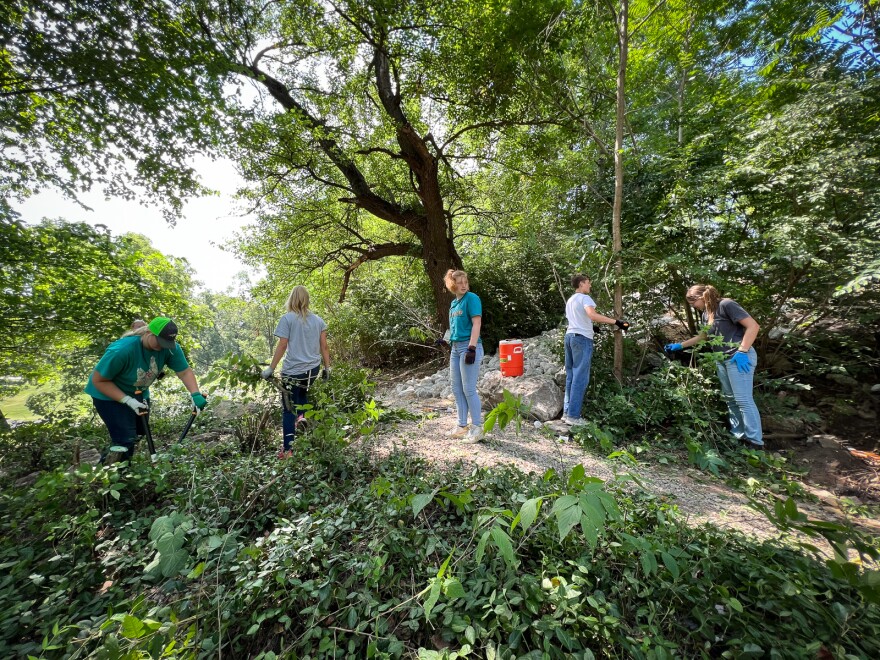The Missouri legislature is considering a bill that would punish plant nurseries that sell five non-native invasive plants.
The bill would effectively ban the sale of burning bush, Callery pear, climbing euonymus, Japanese honeysuckle and sericea lespedeza. Nurseries or nursery dealers that buy, sell or propagate the plants would have their certificate suspended by the Department of Agriculture.
Some of the plants on the list became popular in landscaping. The Callery pear, commonly known as the Bradford pear, was widely used to decorate subdivisions throughout the Midwest in the 1950’s, but it is invasive and can form large colonies.
Experts say the plants on this list threaten Missouri’s native ecosystems because they can escape cultivation and don’t have natural competitors to slow their spread.
“That plant can't stop itself from growing,” said Jean Ponzi, a green resources manager with the Missouri Botanical Garden. “The invader will out-compete the native plants and disrupt or destroy the integrity and the health of native ecosystems, which support pollinators, clean and manage water, restore food webs and sequester carbon.”
The plants can also be an expensive problem for foresters, ranchers and landowners. Bruce Sassmann is a Republican who represents a district southeast of Jefferson City and sponsored the legislation. He says he has had first-hand knowledge of the plants listed in his bill on his farm.
“We've done all kinds of things to have the tools to let us get out on the landscape and try to control these plants,” Sassmann said. “It's just tough. It's an ongoing battle. You just have to work at it.”
Sassmann tried to introduce broader legislation related to invasive plants last session. The bill would have potentially prohibited the sale of more plants and would have required sellers to label potentially invasive plants in stores. Sassmann said that legislation was ultimately “too big of a bite out of the apple,” and hopes this new bill can strike the right political balance to become law.
At a committee hearing Tuesday, there was both support and pushback to the bill. Some from the nursery industry spoke against the proposal, expressing worries that the list of prohibited plants could grow and saying education has already cut down on demand for these plants, so they don’t believe the law is necessary. The Department of Agriculture also said it would need to add 13 full-time staff members to monitor sellers across the state to enforce the law.
The bill still has many hurdles to clear before becoming law, the first of which would be making it out of committee. In the meantime, Ponzi said people can make a difference at home, by shifting their thinking in the garden.
“Working with the ecological relationships of insects and plants is not the main thing that we have learned to do in our modern society,” Ponzi said. “We have learned to get pretty new things that will grow fast, bloom long, and may need a lot of water and herbicides and pesticides to keep them healthy et cetera, et cetera.”
Many Missouri organizations are working to promote increased use of native plants in landscaping. The Missouri Prairie Foundation’s Grow Native! initiative and the Missouri Invasive Plant Council have recommendations for native plants to choose instead of the Bradford pear and bush honeysuckle. The Invasive Plant Council helped Rep. Sassman choose the five species of plants listed in the bill, after soliciting feedback from more than 90 stakeholder groups and the public.
“Even though I definitely advocate for planting native plants, native shrubs and trees, there are non-native choices as well that are not invasive,” said Carol Davit, director of the Missouri Prairie Foundation and chair of the Missouri Invasive Plant Council. “But in terms of native shrubs and trees, another added benefit to choosing them is that native insects have evolved with native shrubs and trees and every other plant, and those native plants are the basis for the food chain. They support nature's web of life.”
Copyright 2024 St. Louis Public Radio. To see more, visit St. Louis Public Radio.






